
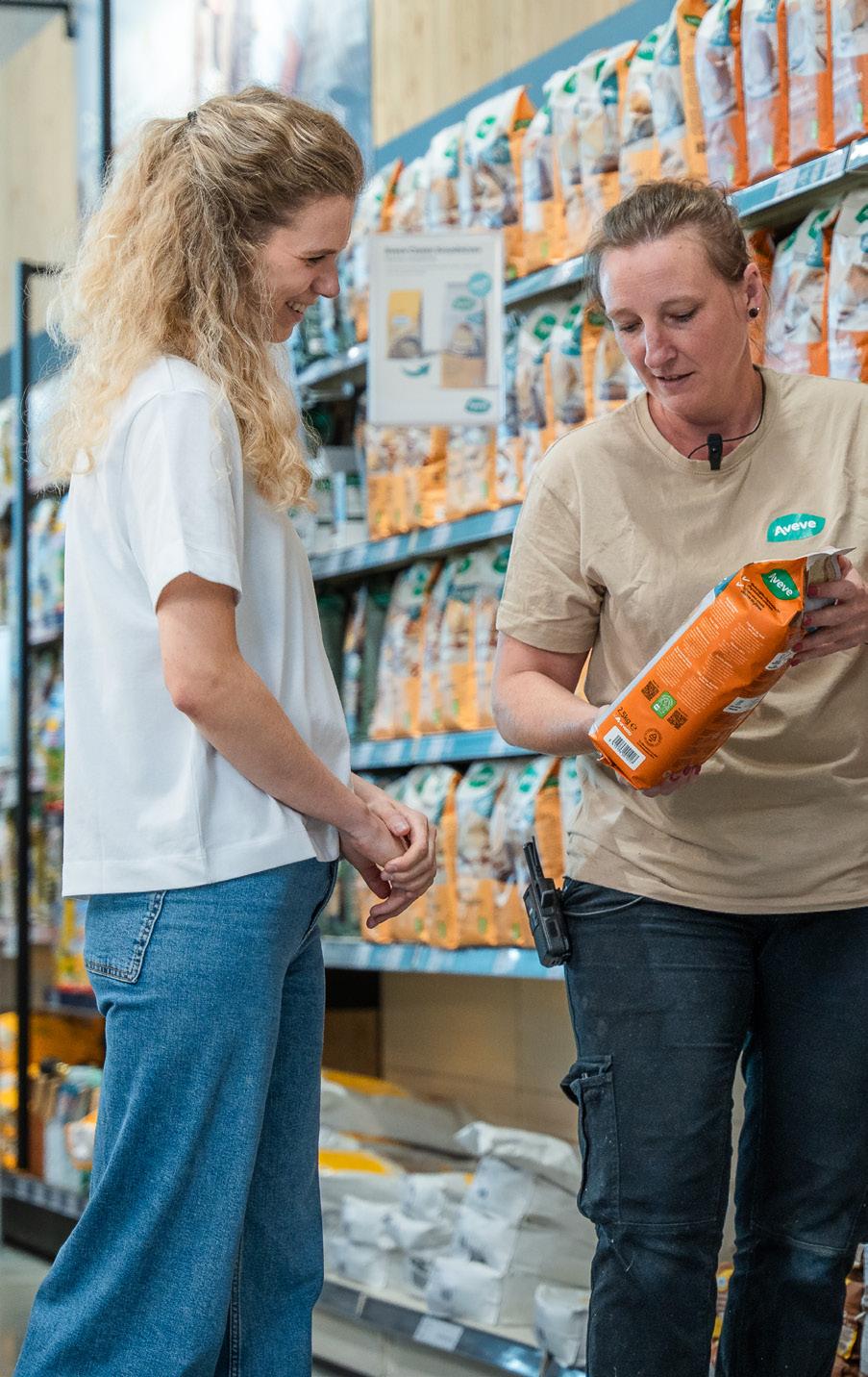







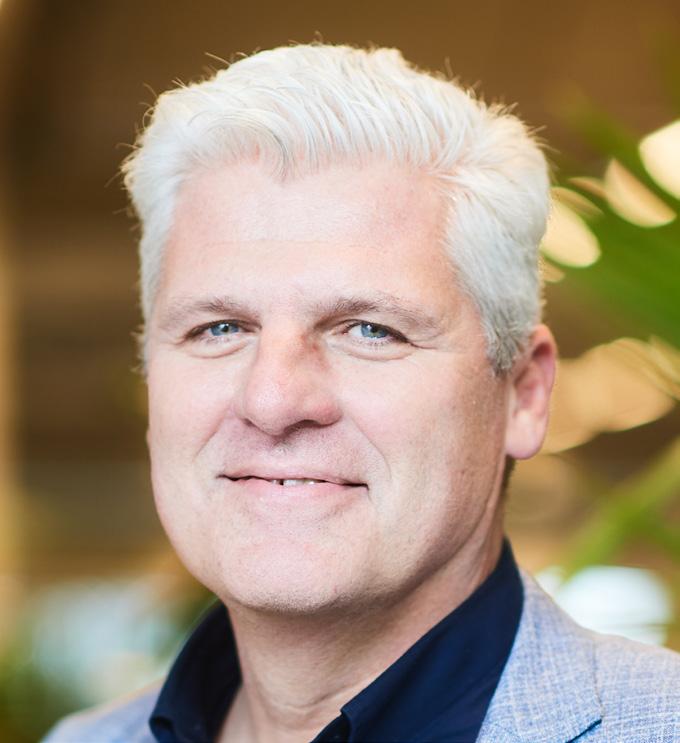
How do you look back on 2024, your first year as CEO of Arvesta?
The past year was marked by extreme weather, volatile prices, and global tensions. Despite these difficult conditions, we performed better financially than in 2023, although we are keeping a close eye on rising costs and investments.
In a world full of uncertainty - where you don't know in the morning what the evening will bring - our Arvesta DNA clearly emerged: we are a dynamic, international organisation with 2,300 experts who deliver and persevere. People who really make a difference for our customers with their advice and solutions. As a full-service supplier, Arvesta focuses on solutions that strengthen agriculture and horticulture and make it future-proof, even in an unpredictable market. That is what drives us.
What steps is Arvesta taking to deal with climate change and other environmental challenges?
Climate change is hitting our industry, customers, and planet ever harder. That is why we have long been taking concrete steps to start and scale up sustainability projects: with Euroclim we help hundreds of cattle farmers reduce their ecological footprint, with our greenhouse technology our horticultural customers save billions of litres of water, and with various initiatives we are moving towards a circular economy. At Arvesta,
sustainability is about what we do in the field: making our solutions applicable and impactful.
In terms of sustainability, we remain ambitious and continue to invest in solutions that are economically and ecologically feasible for our customers and consumers.
What are the main strategic priorities for Arvesta in the coming years?
In 2025, we aim to further strengthen our market share. In addition, in a market with very thin margins, we will continue to strive for even higher cost efficiency - without compromising on quality - so that we continue to provide our customers with optimal service. Our focus remains unchanged: on one hand, we are offering profitable and sustainable solutions to our customers. We continuously invest in innovation, digitalisation (such as
precision farming) and strengthening our retail position. And on the other hand, we remain committed to the satisfaction, growth, and well-being of our employees.
Finally, how do you look at 2025?
We are fully committed to a healthy and profitable growth of our business, always putting our customers first. By further optimising our organisation, we not only strengthen our efficiency but also ensure a sustainable and cost-conscious approach.
Niek Depoorter Chief Executive Officer
We firmly believe in the future and the strategic importance of local and sustainable food. This is precisely why we continue to invest most of our company profits back into the sector.
January
For the second year in a row, John Deere Belgium ranks number one as the best-selling agricultural tractor

March
� Fully revamped Aveve shop in Deinze reopens.
� Animal Nutrition operations move from Erpe-Mere to Kortrijk

May
� Construction of 'Nuverta'
- a state-of-the-art vegetable protein plant – starts in Mettet.
� Opening of renovated site in Esquelbecq (Vaesken).
February
Arvesta shines with its strong brands, including the new Proxani brand, at the Agridagen fair in Ravels.

April
Aveve partnered with Kom op tegen Kanker and donates 2 euros per bouquet sold to the charity.


June
Successful collaboration between Cristal and Arvesta around sustainable malting barley

July
Cofabel expands further and acquires Martens Traktor Bree.
Arvesta
August
Cooperation between Delhaize, La Lorraine Bakery Group, Paniflower and Arvesta on sustainable bread based on Belgian regenerative wheat.

September
New field research on fertigation shows the benefits of our innovative solution even in a very wet season.


November
Aveve shop in Namur reopens after move.


October
� Van der Hoeven and Hortiplan unveil groundbreaking glass-horticulture project in Virginia, US.
� Equilannoo, a new brand in horse feed is launched.
December

New silo complex in Andenne.

123 YEARS as the partner for agriculture and horticulture
More than 40 strong brands across 3 industries
Sustainability at Arvesta
About Arvesta Sustainability at Arvesta
€250 MILLION invested in innovation, IT, production sites and sustainability initiatives (2021-2025)
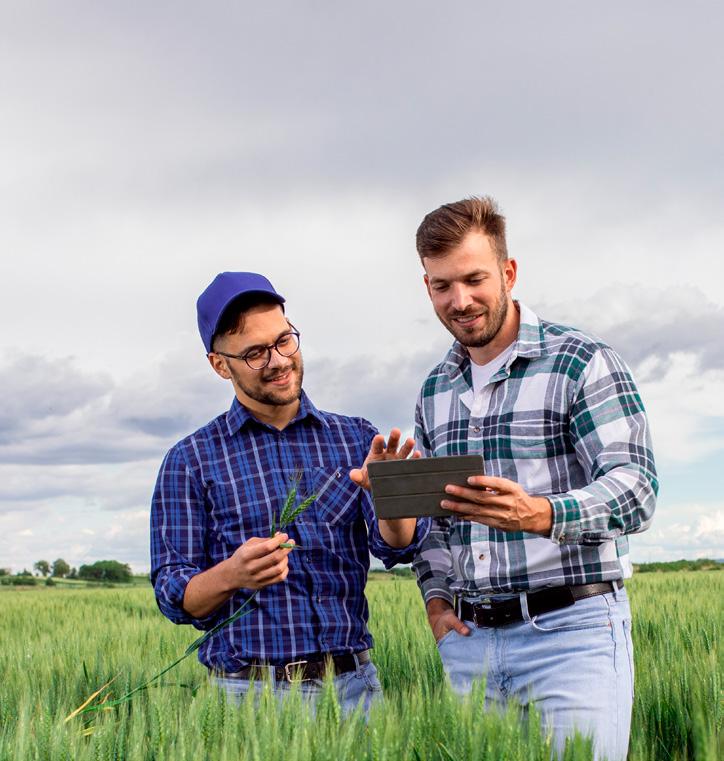
2.300 EXPERTS 2,300 EXPERTS in the field

Nutrition
1.8 MILLION TONNES global sales per year
production sites
in both professional and hobby feeds

Agri & Horti
Belgium’s market leader in seeds, grains, plant nutrition, and protection for all crops
Global market leader in mobile gully systems with Hortiplan and greenhouses with Van der Hoeven
Importer and distributor of John Deere
headquartered in Belgium, with offices in Belgium, the Netherlands, Germany, and France

Avevestores Eurotuinstores
under own management
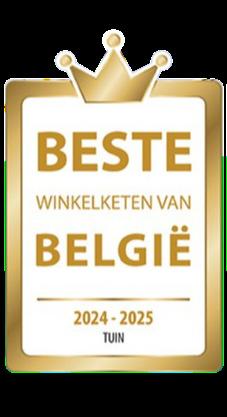
m2 of shopping pleasure


consecutive years

Kris Geysels Chief Financial Officer
In 2024, Arvesta was able to increase EBITDA and achieve positive EBIT despite difficult market conditions. Our long-term strategy, our strong brands, and our 2,300 experts enable us to meet the challenges in which the agricultural sector continues to operate.



Arvesta BV has a collegiate management body ('Board of Directors'). The Board of Directors draws up the strategy and is responsible for the general policy. The Board of Directors manages as a collegiate body and is accountable to the General Meeting, which appoints and dismisses the directors and decides annually on the discharge of the directors.
In 2025, the mandates of Ms Marleen Vaesen (permanent representative of Mavac BV), Ms Rianne Van Tilburg, and Messrs Kurt Deketelaere (permanent representative of KDK BV) and Stefaan Gheeraert expired.
The outgoing directors were thanked in detail at the last meeting of the governing body in April this year for their valued and constructive input over the past few years.
On the recommendation of the governing body and with the favourable opinion of the remuneration and appointments committee, the general meeting resolved to:
• renew the mandate of KDK BV, with Mr Kurt Deketelaere as its permanent representative, for a period of four years, i.e. until after the end of the annual meeting in 2029, which will decide on the annual accounts of the 2028 financial year.
• appoint Ms. Ann-Sophie Desmet as a director, with effect from the general meeting in May 2025 until after the annual meeting in 2029 that will decide on the annual accounts for the 2028 financial year.
• to appoint Mr. Jan van den Keybus as a director, with effect from the general meeting in May 2025 until after the annual meeting in 2029, which will decide on the annual accounts for the 2028 financial year.
Ms. Marleen Vaesen's mandate will be filled in due course by a director with the necessary experience in IT, digitalisation, and innovation. The mandate of the auditor Ernst & Young Bedrijfsrevisoren BV, represented by Mr. Wim Van Gasse also expired at the annual meeting in 2025. On the proposal of the management body and with favourable advice from the Audit and Risk Committee, the general meeting decided to renew the mandate of the auditor Ernst & Young Bedrijfsrevisoren BV for a period of three years, until after the end of the annual meeting in 2028, which will decide on the annual accounts of the 2027 financial year.

Sonja De Becker
Chairman of the Board MRBB
Chairman of the Board Arvesta Director on behalf of MRBB


Executive Director
CEO Arvesta
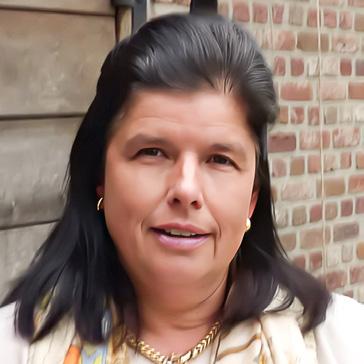







Arvesta's Executive Committee (ExCom) is composed of nine members since 1 April 2025.
From 1 January 2025, Kristof Douven has assumed the role of BU Director Franchise & Retail, succeeding Stefaan De Clercq. Kristof previously served as Sourcing & Supply Chain Director within BU Franchise & Retail. His mission will be to continuously innovate and respond flexibly to the rapidly changing dynamics of the retail market. Kristof already has 17 years of experience within the retail landscape and has used this experience within BU Franchise & Retail over the past years. With his experience, we look forward to further shaping our future and adapting to tomorrow's challenges.
On 1 April 2025, Jurgen Van Eetvelde took over as Chief Financial Officer from Kris Geysels. Jurgen, who until then was Shared Services Centre Director, has made a significant contribution to the optimisation of the Arvesta Shared Services Centre since 2017. Before joining Arvesta, he built up extensive expertise in various financial functions, which gives him a strong foundation to successfully fill his new role. With his experience and strategic vision, he will further strengthen Arvesta's Finance department.
Kris Geysels has taken up the new role of Director Greenhouse and M&A from 1 April 2025, reporting to CEO Niek Depoorter. Kris will also continue to lead M&A projects for Arvesta and help shape a number of strategic business projects.
St�n Vermeulen
Jurgen Van Eetvelde
Financial Officer (since 1 April 2025) Niek Depoorter
Van Roy
Kris Geysels


Arvesta aims to increase the returns of farmers and horticulturists in a sustainable and innovative way to further grow together. We do this by optimising the use of different types of capital and resources and creating value with and for our various stakeholders.
Human capital
• Diversified group of 2,300 Experts in the field with 33 nationalities and 29% women.
• Average of 3 hours of registered training per employee.
• Expertise from external partners.
Financial sources
• EUR 250 million investment (2021-2025)
• EUR 444.6 million equity (2024)
Natural resources
• 32,574 MWh fossil fuels
• 61,110 MWh of natural gas
• 210,000 m² of shopping fun at Aveve
From
Our Experts in the field guarantee farmers and gardeners a long-term future with pragmatic and innovative solutions. The result is better returns for our customers, satisfied shoppers in unique shops and healthy, sustainable food on the table.
Contributing to the Sustainable Development Goals



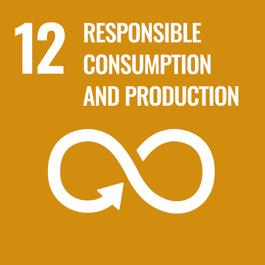
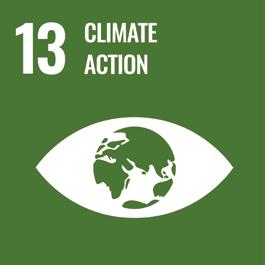


(B2B & consumers)
• Animal Nutrition: 15,576 customers (B2B)
• Agri & Horti: 15,000 customers (B2B)
• 970,000 active MyAveve cardholders in Aveve Retail (B2C).
• 294 new recruits
• 100% owned by financial holding company MRBB
• EUR 45.9 million EBITDA
• 80 preferred suppliers completed Arvesta's Procurement Sustainability Assessment in 2024. The average score among assessed suppliers was 67%.
• A sustainability score will be prepared in 2025 for the 3 Business Units.
• 3,538 indirect suppliers in Belgium.
• More than €8 million tax contributions in Belgium, the Netherlands, France, and Germany (excluding social contributions and withholding taxes).
• Arvesta serves 20 animal groups, feeding about 20% (or 1 in 5) of the animals in Belgium.
• Arvesta provides 70 different crops good for 600,000 ha.
• Our Experts in the field meet 700 farmers and horticulturists every day.


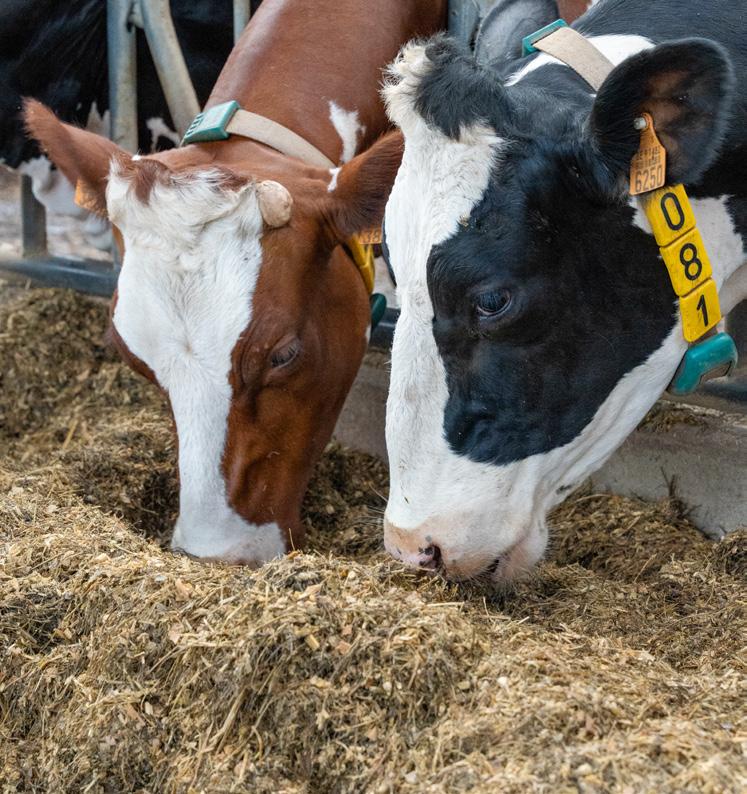













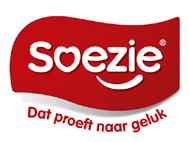

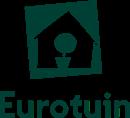



Positive tendency in livestock sector offers opportunities
on
As the market leader in the Belgian animal feed sector, Arvesta Animal Nutrition's fate is closely linked to that of our livestock farmers. After a year of growing market demand and clear focus on efficiency gains, Dirk Van Thielen heads the Animal Nutrition Business Unit and looks back on 2024 with satisfaction.
Could Arvesta ride on the positive trend in the livestock sector?
"All of the laying hen, broiler, pig, beef cattle, and dairy sectors were experiencing good economic conditions. Livestock farmers wanted to maximise their production and this boosted sales of our animal feeds and additives. We were able to firmly maintain our position as a pronounced market leader."
Did you come out with any new brands?
"Proxani was already launched in 2023, but 2024 was the year we integrated it into Arvesta and harmonised the ranges. We also introduced our new horse feed line, EquiLannoo - a merger of EquiFirst and Lannoo."
An efficiency exercise also happened.



We were able to firmly establish our position as a distinct market leader.
"Both the modernisation of the Andenne site and the transfer of operations from ErpeMere to Kortrijk contributed to this exercise. We are bundling the distribution of bagged goods through a central point so that deliveries to customers, across brands, can be made as efficiently as possible."
Could further sustainability efforts also be made?
"Definitely! The selection of a recognised tool to map the carbon footprint of our feeds is a big step. There was also a test with soya (meal) in line with the EU Deforestation Regulation against deforestation and a project

Business Unit Director
where soya (meal) is being replaced with local protein from our Nuverta line. We are also promoting our methane-reducing feed, Euroclim. The production of medicated feeds will stop completely by the end of 2026. And Palital's feed additives also achieved nice growth, which is a step forward in terms of animal health. The Better Chicken Commitment feed line grew less strongly than expected, which can be explained by limited market demand for BCC welfare chickens."
"For now, prices in the livestock sector seem largely capable of maintaining their levels and the outlook is good. Although it remains to be seen how strongly we will feel the effects of the buy-out scheme in pig farming. Maintaining our volume as efficiently and sustainably as possible is the absolute priority."
Growth despite a challenging spring
2024 began as 2023 ended, namely with very high rainfall. The wet spring put a dampener on seed and fertiliser sales. But thanks to new concepts, innovations, and infrastructure, 2024 was still a growth story. Kris Moerman has headed the Agri & Horti Business Unit at Arvesta since January 2024. He looks back on an eventful year.
How strongly did the wet spring affect you?
"A lot of farmers had to revise their cropping plans due to the persistent rain. Less grain was sown and, as a full-service partner, we feel that very strongly. Despite this setback, we were not only able to maintain our market share in Aveve fertilisers, but even expand it."
More commitment to innovation?

Kris Moerman Business Unit Director Agri & Horti

We are boosting local, plant-based protein production thanks to our brandnew 'Nuverta' line.
"Absolutely. 2024 was the year in which we further strengthened the innovative solutions and concepts that fit within our 2030 vision. We brought new organic additives and foliar feeds to the market, further expanded our operation around carbon farming, and remain committed to the Varicare and fertigation concepts. In January, we started up the brandnew factory in Mettet, where we produce vegetable proteins under the name 'Nuverta' from locally grown, sustainable peas while giving farmers a better return. We have signed contracts for about 100 ha of yellow peas and the aim is to expand to 3,000 ha, in cooperation with local farmers. Also, the investments we made in fertiliser production in Farciennes and seed triage in Landen make us future-proof."
Are there any major updates at Cofabel, Arvesta's machine dealer?
"For tractors over 150 hp, we are once again at the top of Belgian sales with John Deere. A remarkable achievement. Within the 'Dealer
of Tomorrow' project, we are strengthening our own dealerships, resulting in new Cofabel branches in Bree and Sint-Truiden. Thus, the counter already stands at eight."
What challenges and opportunities do you see for 2025?
"The volatility of the fertiliser market poses risks and cooling machinery sales also require our attention. Due to the current geopolitical situation, grain trade is struggling. But thanks to our investments in innovation and a strong team of dynamic and experienced experts, we are ready to give our best again."




Aveve and Eurotuin shops continued to guarantee a range that makes animal and garden lovers as well as home bakers happy in 2024. The wet spring put pressure on sales, but customer satisfaction remains high. Further investment in a shop concept tailored to the customer is therefore the priority. Kristof Douven was given responsibility for the Franchise & Retail Business Unit at the start of 2025. He sees a lot of opportunities.

Kristof Douven Business Unit Director
Franchise & Retail

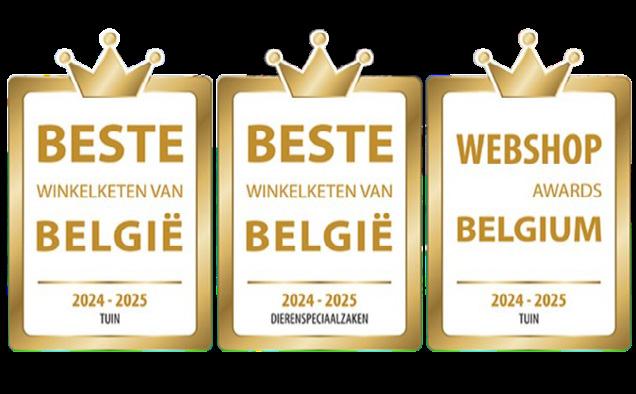
What impact did the increased rainfall have on consumer behaviour?
"Sales of garden products are strongly linked to the weather. Customers postponed their purchases until spring finally came and we see that in our figures. Profitability came under some pressure as fixed costs rose sharply. Despite the slow start in sales, the year still ended relatively well, also due to sales of pet food and flour, which held up nicely."
How important is customer communication?
We listen carefully to the needs of our customers to always provide the best service.
"We invest heavily in communicating with our customers. Thanks to extensive market research, we gained insight into what our customers find important and how we can tailor our shops even better to this. Our basis remains a high-quality product, founded on our agricultural expertise: our products are technically high-quality and offer a high degree of certainty of results. In addition, working in your garden, interacting with your pets, and baking are moments of relaxation in an increasingly busy society. Our offer supports spending quality time at your home. We convey that message through customer communication, but certainly also in our shopping experience."
What do the satisfaction figures say?
"For the 17th year in a row, Aveve was voted the best retail chain in the Garden and Animal segment and our webshop was also awarded
first place. Our Net Promoter Score, which measures customer satisfaction through surveys, continues to peak at over 73%. We can be proud of that."
Will sustainability remain at the top of the agenda?
"Absolutely. With the efforts we have already made in terms of water collection, the switch to LED lighting, recyclable packaging, and reducing peat in potting soil, we are shifting up another gear. Our soy-free chicken feed is a feat of innovation and sustainability. We also aim to transport goods as efficiently as possible and work with local grains from the carbon farming project for our flour mixes. Customers can certainly appreciate that!"
Proper value distribution throughout the chain
Arvesta is not only a supplier to farmers and market gardeners, but also works with processing and retail to add value to top locally produced products. A unique position that comes with great responsibility.
chain
Bridging the gap from field to plate is what we are all about. Thanks to our central position in the chain, we can help match supply and demand. When farmers and processors find each other, agreements can be made on quality, volume, price, and additional sustainability efforts. You are less dependent on the whims of the global market. Moreover, these collaborations create added value within the food chain and better returns for farmers.
Connecting supply and demand
Arvesta is taking an active role in this story. Through our long-standing collaborations with Cristal Alken and Lu Harmony, among others, we ensure that local farmers can grow malting wheat and malting barley without worrying about outlets. Pierre Warnier, farmer and brewing barley grower, says: "With all our crops, we strive for the highest quality. That is what we want to distinguish ourselves on as farmers. We find that shared passion with Arvesta and Cristal's brewers. Contributing to a quality and Belgian product is an important added value for us."
We are proud to use local barley from Belgian farmers for our Cristal beer!
Ellen Mertens Master brewer at Cristal Alken
Processing companies, on the other hand, are assured of raw materials that meet their specific quality and sustainability requirements. We also contribute to securing outlets for locally produced vegetable proteins from yellow peas through the new Nuverta brand, launched in 2024. Of course, retail is also an indispensable part of the puzzle. We do that through our own shops and partners such as Delhaize.


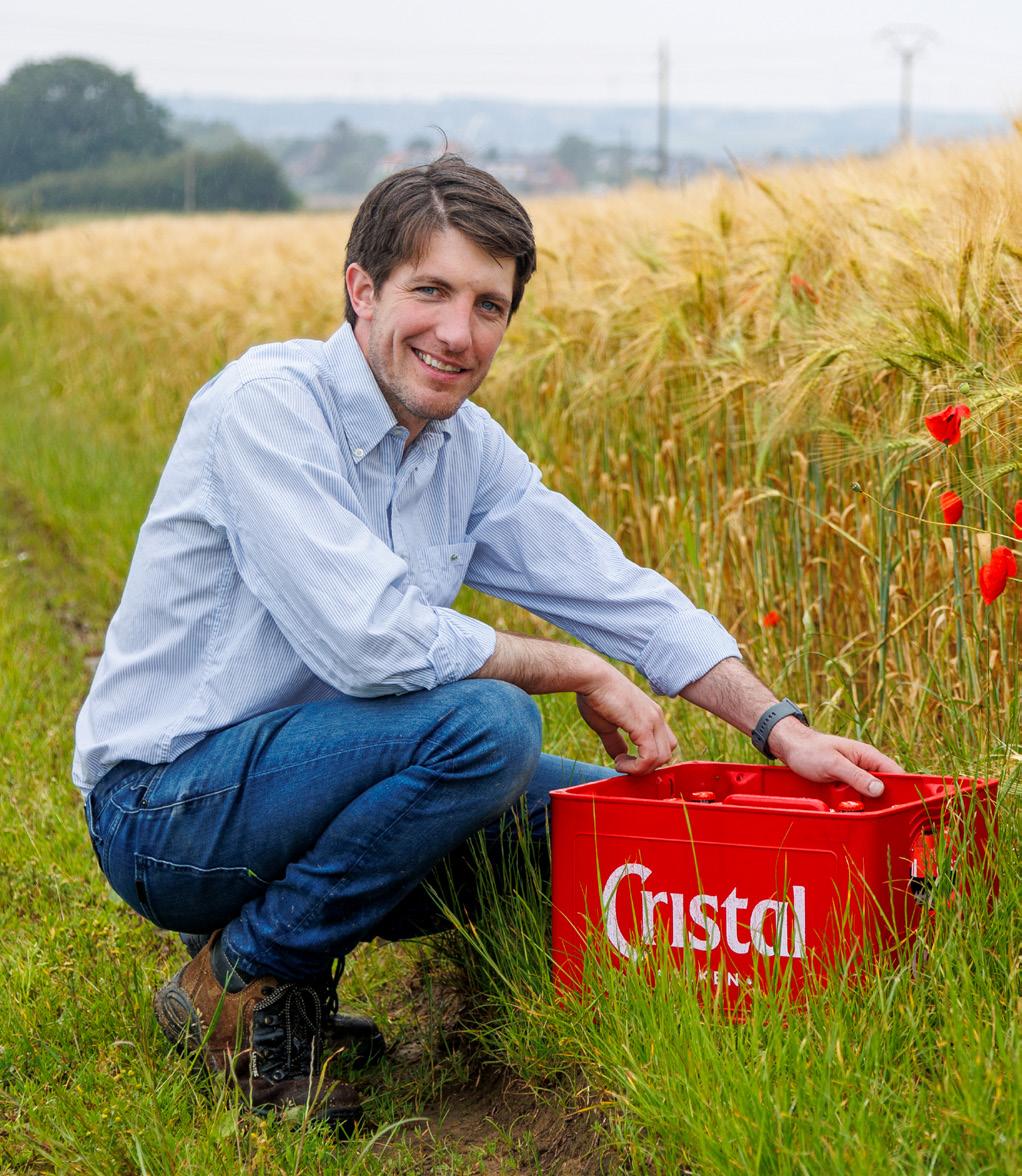
A fair price for each link in that chain is a prerequisite for building a long-term cooperation. Arvesta therefore seeks a good balance that respects everyone. Sustainability need not be a major cost within a bigger picture, as long as the product is correctly valued from farmer to consumer.

Arvesta
Arvesta sustainability framework
In 2023, Arvesta created a new sustainability framework. Underlying the sustainability framework is Arvesta's mission statement, 'From Field to Future,' complemented by the ambitions within the Environment (E), Social (S) and Governance (G) pillars. In doing so, we focus on our key stakeholders, namely farmers, market gardeners, the planet as well as our employees and consumers.
Preparing for new regulations
As a company, Arvesta falls within the scope of the Corporate Sustainability Reporting Directive (CSRD). We are in full preparation to report according to CSRD.
Caring for our people and customers
Sustainability
Sustainability at Arvesta
On 26 February 2025, the European Commission published the Omnibus Package, a set of proposals aimed at reducing the administrative burden on companies regarding sustainability reporting. Among other things, this package makes adjustments to the CSRD and the EU Taxonomy.
We continue to closely monitor the evolutions of the Omnibus package and the impact on our sustainability reporting (e.g. timing, revision of ESRS, and data points) to ensure full compliance.
Sustainability remains important for Arvesta, for our customers, suppliers, and our ecosystem. The opportunities and risks related to ESG remain relevant. We continue to work on the path we have embarked on, namely to contribute to the sustainable agriculture of the future.
Developing sustainable and innovative solutions
Our local experts with a passion for agriculture guarantee a long-term future for farmers and horticulturists with pragmatic and innovative solutions.
The result: better returns for our clients, satisfied shoppers in unique stores and healthy, sustainable food on the table.
Ensuring good business management
Arvesta Sustainability
Our take on sustainability
reporting with common sense
Sustainability reporting is more important than ever and is constantly evolving. Our Sustainability Director, Stéphanie Deleul, shares some of the opportunities and challenges that lie ahead.
Is sustainability and its reporting ingrained in the Arvesta DNA?
"Absolutely, we believe that solutions that add economic and environmental value are the way forward. That combination is necessary. In recent years, the regulations around reporting have evolved a lot, so we are paying more attention to this. Although our view remains that common sense should be number one. We are not going to report for reporting's sake, but make sure that this provides valuable insights that show that we are really making a difference in the field."
What key steps were taken in 2024?
"For example, our focus on carbon farming has broadened to regenerative agriculture. Here, we go for viable solutions so that no farmers are left out. Because we see it as our job to help them cope with climate change and switch to more sustainable farming practices. With the start-up of Nuverta, our vegetable protein processing business, we are actively contributing to a future for high-quality vegetable and animal proteins, thus completing the circle. A sustainable future for our local
farmers is paramount, which is why our chainwide approach is more important than ever."
How is Arvesta dealing with the rapidly changing requirements around reporting?
"We take a very pragmatic approach. This annual Activity Report is there not only to tell the outside world what we are doing, but to gain insight into our efforts and the results they produce ourselves. Our Experts in the Field are central because they realise progress on the ground. Only an internally supported sustainability policy can really make a difference."

Stéphanie Deleul Sustainability Director Arvesta
Before you can report, you have to realise progress on the field.


As a key part of our work to prepare for CSRD reporting, Arvesta conducted a double materiality assessment (DMA) in 2023 and early 2024, in line with CSRD guidelines.
The DMA helps determine which topics are considered material by assessing the impacts, risks, and opportunities (IROs) associated with them. Two perspectives are taken into account:
• (i) impact materiality, which assesses the impact Arvesta has on the environment and society in relation to a topic; and
• (ii) financial materiality, which assesses the potential impact a topic may have in the future on Arvesta's financial success. The union of these two perspectives results in double materiality.
A total of 157 IROs were identified based on insights from desk research and stakeholder consultations. Each IRO was successively assessed against the evaluation criteria imposed by CSRD, resulting in 66 IROs that were considered material.
In total, the double materiality process resulted in 16 material topics that are material to Arvesta, either from the perspective of impact materiality, financial materiality, or both.
The result is visualised to the right (the topic in the white quadrant is not material). In doing so, each topic within the figure below is represented according to the maximum score for impacts (Y-axis) and risks and opportunities (X-axis).
Building on our sustainability journey, we refined our ESG approach in 2024 to maximise impact. Based on input from various stakeholders and a strategic review, we identified six ESG domains where we can make the most meaningful impact.
Instead of dividing our attention across 20 separate priorities, we are now deepening our focus within those six ESG domains with eight targets by 2030. For these eight targets, we are currently developing action plans and will report progress annually.
The ESG priorities for Arvesta, to which we are fully committed, focus on strengthening our positive impacts, mitigating negative impacts, and managing risks and opportunities. We therefore continue to pursue the material IROs as further described in the report.

Sustainability is increasingly integrated into our operations and solutions. With an ESG framework and governance setting out our environmental, social, and management efforts for Arvesta, we not only ensure concrete steps forward, but also better meet our stakeholders' expectations and stricter regulatory frameworks and standards.
Arvesta wants sustainability to be embedded in all its aspects at every level. This includes both centralised and decentralised organisation of ESG activities. We can only get started when the organisational structure is clear and employees know where their responsibilities lie.
In putting together ESG governance, we formed and refined the appropriate steering and decision-making bodies within the existing organisational structure. This also includes establishing control mechanisms.
Efforts are made by every employee, but it is important that managers create a clear framework in which choices are made and results do not go unnoticed. Proper governance is an indispensable element in this regard.
Last year, the right processes were set up to manage ESG topics. We designated process owners, defined the process frequency, and defined the roles and responsibilities of all involved.
ESG governance
Board of Directors
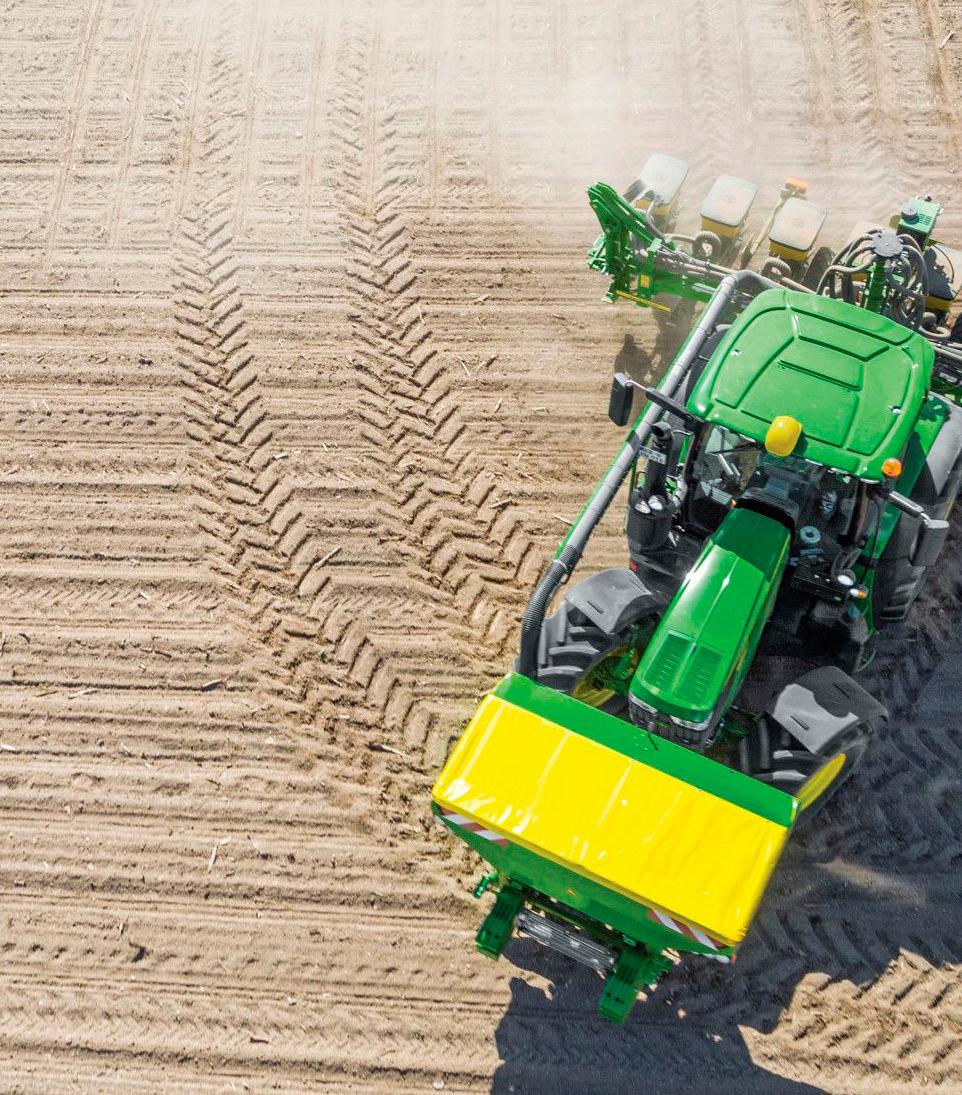
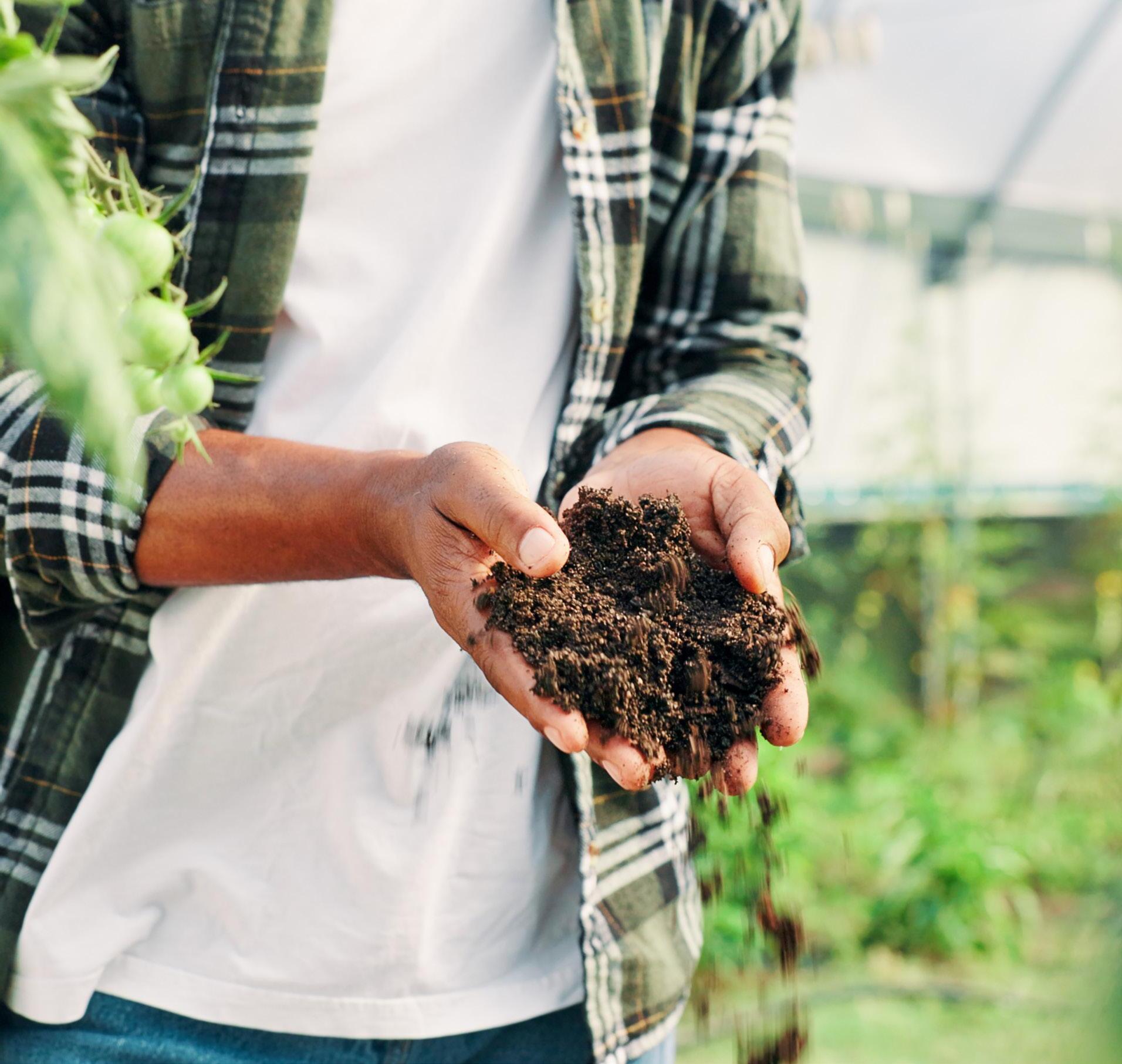
A clean living environment is the basis for healthy plants, animals, and people. As a full-service partner for farmers and horticulturists, at Arvesta we value the natural world enormously and make continuous efforts to have a positive impact on the environment.
Our farmers are feeling the effects of climate change every day and we see it as Arvesta's duty to play our part in responsible climate action. Not only do we want to reduce our emissions and green our energy consumption, but we also seek to increase the resilience of our organisation - and the broader value chain in which we work - to the effects of climate change.
The earth is a breeding ground teeming with life, or at least it should be. At Arvesta we are doing our part to contribute to a healthier planet by working towards more biodiversity, higher air quality, smart water management, and valorising residual flows.
But we also look beyond our own organisation and set a high environmental bar for the partners we work with. Alone you can go fast, together you go further!
Climate change is ever-present in Belgium and abroad, and farmers and horticulturalists feel its effects first-hand. For a full-service partner in the sector such as Arvesta, it is therefore essential to be aware and manage the risks involved.

Our material impacts, risks, and opportunities (2)
Opportunities
• Demand for drought-resistant crops in water-stressed regions.
• Carbon farming practice and soil management.
Monitoring and controlling risks as much as possible
At the heart of the agri-food chain
At Arvesta, we are not only committed to combating climate change but are also aware of the need to adapt to changing realities. Since we are in the middle of the agri-food chain, we consider climate change as one of the three main risks for our organisation.
We work with local partners as much as possible, but the price of the raw materials we buy depends on the vagaries of the global market. Therefore, a team of employees is constantly monitoring international weather phenomena and political trends, as these determine the market price of our raw materials. We also ensure that employees are aware of these risks by organising regular workshops. Unfortunately, we cannot make risks
disappear, but maximum climate resilience is an important requirement we place on our suppliers.
Cooperation with our customers is also strongly influenced by climate change. Extreme weather conditions impact our sales figures and confront farmers and horticulturalists with new issues. Thanks to our climate-friendly concepts and innovative products, we search for climate-robust solutions together with the sector.

Arvesta
Global warming is a given, but at Arvesta we are not sitting on our hands –we help combat climate change every day. By making our own operations more sustainable, but also by supporting farmers and horticulturalists with feasible and effective solutions.
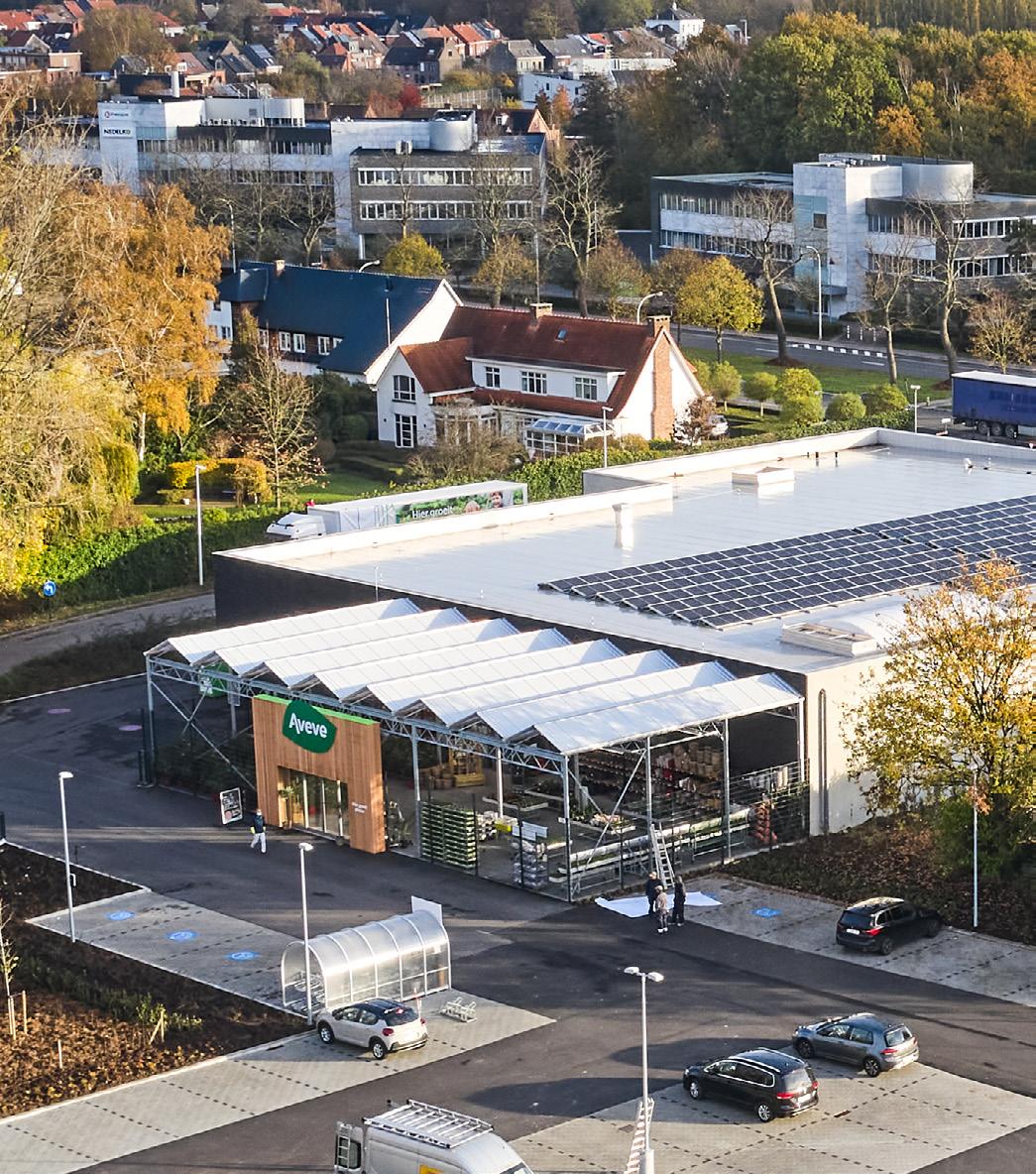

Our material impacts, risks, and opportunities (9)
Positive impacts
These meetings allow us to continuously work across business units on energy management improvements and innovations.
Sustainability
Sustainability
• Be a pioneer in the Carbon Farming approach and develop associated products, techniques, and services for the value chain and farmers.
• Development of methane-reducing feed, Euroclim.
• Further investment in the use of renewable energy (through solar panels and green power contracts).
Negative impacts
• Significant scope 1 and scope 2 emissions.
• Significant scope 3 emissions.
Risks
• Current and emerging energy - and carbon-related regulations weighing on costs (e.g. carbon tax, CBAM, ETS).
• High energy costs and exposure to energy-related financial impacts such as price volatility, supply interruption, regulatory changes for long-term PPAs, etc.
Opportunities
• Invest in energy-efficient process improvements.
• Market shift to less carbon-intensive products
To measure is to know
At Arvesta, we focus mainly on reducing our carbon emissions to lower our carbon footprint. To reduce these emissions, we continuously work on reducing our energy consumption.
In 2024, for the first time, we launched a dashboard that gives us a central insight into our energy consumption. This allows us to monitor and optimise our energy consumption more accurately and is also used in our bimonthly Energy Ambassador meetings.
During these meetings, our Energy Ambasadors, Business Unit Controllers, and the Procurement Category Manager Energy meet to discuss energy budgets, consumption, initiatives, awareness, and best practices.
We have also launched an intranet page designed to keep all Arvesta employees informed about the structure and initiatives around energy saving and efficiency within our company.
Taking energy
into account should become a
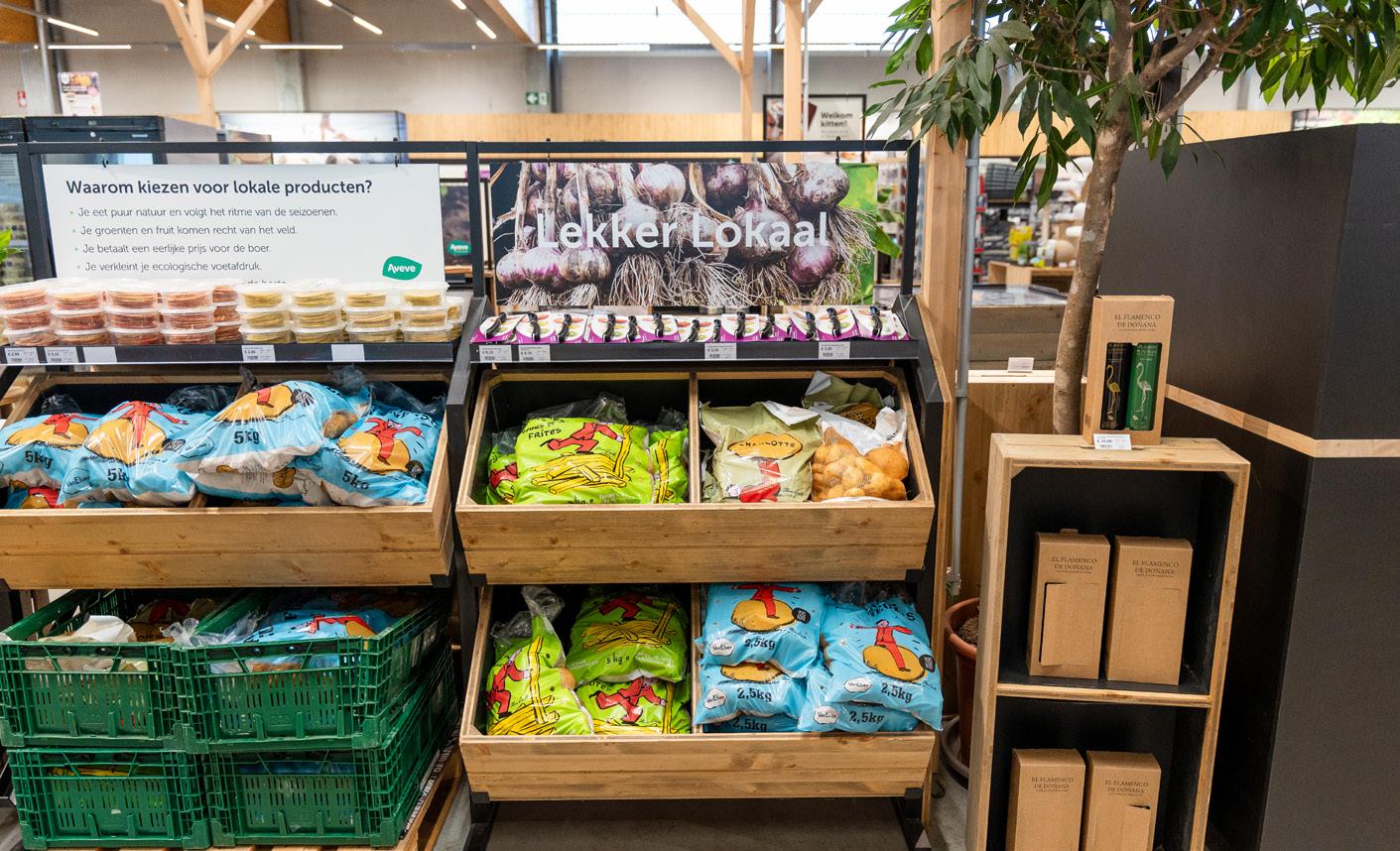
In 2024, Arvesta further mapped and monitored its value chain greenhouse gas emissions in line with the Greenhouse Gas Protocol. We built on our improvements in 2023 by using primary data for a greater proportion of emissions this year. This allows us to determine our scope 3 emissions with even greater accuracy.
Courtesy of the sun
Another way we are reducing our CO2 emissions is by investing in solar panels. For instance, some 4,500 solar panels (612 kWp) were installed in 2024, bringing the total group-wide installed capacity to 4,615 kWp.
This amounts to a CO2 reduction of some 1,700 tonnes. In addition, a number of large installations will be added in 2025. In this way, we continue to focus on sustainability and comply with legislation. But our retail sites are also doing their bit. 20 shops are currently equipped with a smart energy management system, which prevents unnecessary energy consumption after closing time. 32 of our 50 own shops have already switched completely from conventional lighting to LED, and we continue to increase this number.
Mobility and transport are sources of CO2 emissions that should not be underestimated. That is why, since 2024, it is no longer possible for Arvesta employees to opt for a company car running on diesel or petrol. With 142 charging points spread over 36 company
sites and several charging points installed at employees' homes, our electrified fleet is completely future-proof. The transport of goods via transport companies is also under scrutiny. Thanks to smart planning and a central distribution point, we avoid empty runs and - together with our partners - we are looking into the possibility of working with alternatives to diesel-driven trucks.
Farmers are doing better Agriculture and horticulture are in demand to reduce their climate footprint. At Arvesta, we offer a wide range of innovations and concepts that are economically feasible and really make a difference. From biostimulants and circular fertilisers to climate-friendly animal feed, we have it all. Just think of the Euroclim cattle feed that reduces methane emissions by up to 25% and is produced with a low carbon footprint.
Updated emissions base year 2023
In 2024, we not only focused on calculating our emissions for this reporting year but were also able to refine the data for our base year 2023.
The acquisition of ForFarmers Belgium in 2023 necessitated a recalculation of the 2023 baseline, which reflects Arvesta's expanded operational scope. This adjustment mainly affected scope 3 because of ForFarmers' focus on sourcing raw materials and producing animal feed, which involves an amount of agricultural emissions. In addition, we managed to assess emissions more accurately from fertiliser production based on primary data.
These adjustments resulted in a recalculated value for 2023 compared to last year's publication, improving consistency and transparency for year-to-year comparisons.
Our carbon footprint in 2024
This year, total emissions were 2,337,383 tonnes of CO2 equivalents; a decrease of 6.7% compared to last year.
Scope 1 & 2: direct emissions and indirect emissions from energy use
Our scope 1 and scope 2 emissions together amounted to 36,042 tonnes of CO2e; accounting for less than 2% of our total emissions.
Arvesta has not yet entered into green energy contracts, which explains why our market-based emissions are higher than our

location-based emissions. The latter reflect the entire electricity mix in each region, including the share of renewable energy from wind, solar, and hydropower sources. However, our installed solar capacity grew by 13% compared to last year, improving our ability to generate green energy locally.
The most dominant category, scope 3, accounts for more than 98% of our total emissions with 2,301,341 tonnes of CO2e. The largest category within scope 3 was emissions from purchased goods and services, accounting for 71.14% of the total carbon footprint. Emissions from purchased raw materials for animal feed came from the supply chain, including crop growth, common farming practices, and transport to factories. Fertiliser production also made a significant contribution due to its energy-intensive processes.

The second largest category within scope 3 was emissions from the use of products sold, largely caused by methane emissions from animals that digest our feed and nitrogen emissions from the use of fertilisers.
Emissions (tonnes CO2e) (by marketbased method)
Arvesta's carbon footprint
In tonnes CO2e
Where Arvesta can make the biggest difference
We remain committed to reducing our emissions by focusing on the areas where we can have the greatest impact, starting with the sourcing of our raw materials and the products we market.
By sourcing raw materials closer to home, we reduce emissions related to transport and harvesting practices. We continue to invest in the development of Euroclim, our methane-reducing animal feed, which helps reduce emissions from intestinal fermentation.
Together, these targets represent a total carbon footprint reduction of 33% by 2030an average annual reduction of 4.7%. With a current reduction of 6.7%, we are on track and confident that we can continue to reduce our emissions in the coming years.
At the same time, we continue to promote Haspargit, our circular fertiliser made from food industry waste streams. It is a sustainable alternative to energy-intensive synthetic fertilisers.
On course to 2030
Arvesta has translated its ambition for emission reduction into clear targets. For FLAG (Food, Land, and Agriculture)-related emissions, we aim for a 31% reduction. For all non-FLAG-related emissions, we aim for a 42% reduction. Both are to be achieved by 2030 and are in line with the 1.5°C pathway required for a science-based approach, as set out by the Science-Based Targets Initiative (SBTi).
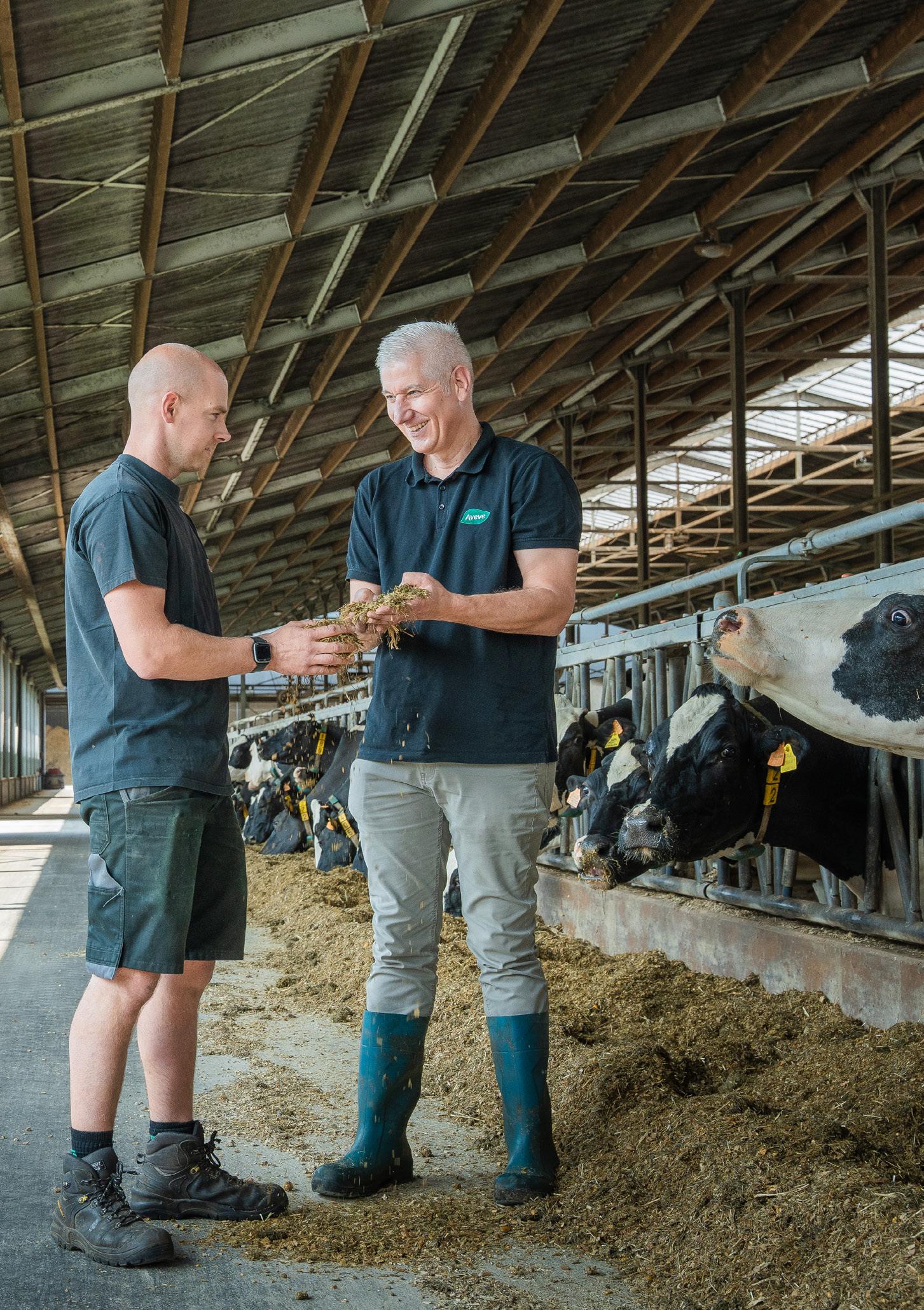
There can be no healthy food production without living soil. With concepts such as carbon farming, Arvesta offers farmers practical tools to improve soil quality and get added value from the CO2 storage they realise. We match the inputs as closely as possible to the needs of the crop, in combination with the potential of that soil. A win-win situation.


Isabelle Huyghe Business Development Director
Our material impacts, risks, and opportunities (7)
Positive impacts
• Providing smart farming solutions for variable application and technical solutions to reduce soil impact.
• Cooperate with the value chain to maintain and improve soil fertility and quality, restore degraded farmland, and store carbon in the soil.
• Diminished negative impact on soil by providing low-impact alternatives to synthetic fertilisers and pesticides.
Negative impact
• Soil degradation and reduced soil fertility due to intensive agricultural practices.
Risk
• Reduced crop yields due to declining soil quality.
Opportunities
• Offering innovative alternatives (e.g. biostimulants) to fertilisers and pesticides.
• Giving farmers advice on soil quality.
Carbon farming
The wet spring of 2024 demonstrated once again that fields with good soil quality and structure are more resistant to extreme weather conditions. Arvesta provides farmers who join the Carbon Farming Club with practical tools to emit fewer greenhouse gases, store more CO2 and boost soil quality. Examples include non-inversion tillage and maximum use of green cover crops and organic fertiliser.
Ecological and economic win
By 2024, 12,800 hectares of farmland were managed by 82 farmers from Belgium and France. In cooperation with Belgian company Soil Capital, farmers are rewarded for their efforts through a system of CO2 certificates.
With our precision agriculture tool Varicare, we aim to match the needs of cultivation as closely as possible with the potential of the soil. To this end, we are further rolling out our Varicare offering to help farmers get started with soil scans, satellite imagery, variable planting, seeding, and fertilisation. Because the more efficiently you work, the fewer inputs are lost and the better for your soil and wallet. In the coming years, we want to broaden the vision around carbon farming and evolve towards regenerative agriculture.
By investing in our sites and maximising prevention, we minimise the risk of negative impacts on people and the environment. And that's the way it should be.

Our material impacts, risks, and opportunities (3)
Positive impact
• Less water pollution due to reduced risk of leaching with e.g. Haspargit and microgranulates.
Negative impacts
• Excretion of methane and ammonia by ruminants and other livestock, with negative impacts on air quality.
• Water pollution from agriculture and animal husbandry.
Keeping air, water, and soil clean
Our comprehensive risk assessments and environmental management systems reveal areas of concern. For Animal Nutrition's 14 production sites, dust emissions pose a potential risk to the environment. By ensuring appropriate dust filters are regularly maintained and replaced, such emissions are greatly reduced. Where necessary, we even adapt our operation and infrastructure to load trucks at a different site location.
Leaching into watercourses must also be avoided at all times. We provide catch basins in which products are collected in case of a leak. Should a spill occur, we have it cleaned up by an authorised firm. At the Andenne production site, our risk analysis showed that the silos no longer met our quality requirements, so we implemented
a complete renewal of the infrastructure in 2024. A heavy investment, but absolutely necessary to tackle environmental risks.
Equally important is soil protection. That is why Agri & Horti's production sites are also equipped with strict risk analysis and environmental care systems to prevent, for example, seeds or fertilisers from entering the environment through a pivot. By supporting farmers with precision techniques - such as Varicareand offering a range of efficient biostimulants, we also do our bit in the wider primary sector to keep air, water, and soil clean.
We are investing in renewing our infrastructure to prevent environmental risks.

Gunter Van Parys Production & Logistics Director Animal Nutrition
Water is the basis of growth in plants and animals. That is why at Arvesta we do everything we can to save as much water as possible and use it intelligently.

Arvesta Sustainability
Our material impacts, risks, and opportunities (3)
Sustainability
Positive impact
• Water savings by farmers and horticulturists thanks to e.g. Arvesta's automated mobile gully and greenhouse systems.
Negative impact
• Extensive water use for crop and livestock irrigation in waterscarce areas.
Opportunity
• Sales of products of e.g. mobile gully and greenhouse systems that allow customers to reduce their water consumption.
Smart building
Infrastructure plays an important role in water conservation, which is why our Animal Nutrition and Agri & Horti production processes are designed to require little or no water. The recently built Arvesta headquarters in Wilsele has a rainwater harvesting system of 40,000 litres and at least 31 of Aveve's 50 own shops are equipped with rainwater basins of 30,000 litres each
Fertigation offers security
Farmers can count on rain to grow their crops, but unfortunately it does not always fall at the right time. Thanks to fertigation - an Arvesta innovation - plants get water and nutrients delivered to the root zone. The drip hose system helps save water and optimises crop yields.
Wide view of greenhouses
We also lead the way in water conservation in Hortiplan and Van der Hoeven’s greenhouse systems. In 2024, we focused on mapping various parameters. Thanks to sensors installed in 2024, we will measure exactly how much water a greenhouse crop consumes, from cooling to irrigation. We will also analyse our greenhouses throughout their production cycle and calculate their footprint. So, water is part of a much larger set of factors that determine the ecological impact of our greenhouses. By looking at this broadly, we can make smart and sustainable choices.
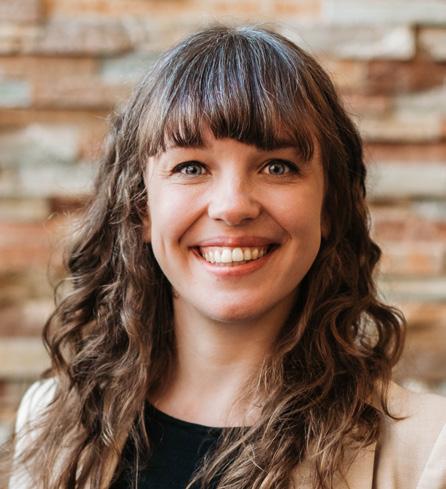
Jessie-Lynn van Egmond
Water & Sustainability Manager
Looking at water within a broader picture creates opportunities.
From innovative biostimulants to sowing a mix of green manures, farmers hold the key to improving biodiversity.

Our material impacts, risks, and opportunities (9)
Positive impacts
• Replace chemically active substances with biological control agents and reduce the dosage of active substances in plant protection products.
• Maintain biodiversity in gardens through flowers, seeds, perennial meadow flowers and plants that attract butterflies and bees as well as natural plant protection products.
Negative impacts
• The use of pesticides on agricultural land because of their toxicological effects on ecosystem services, such as pollination.
• Deforestation, habitat destruction and land-use change in the value chain due to conversion of natural ecosystems to agricultural land.
• Eutrophication due to high nitrogen and phosphorus loads from agricultural activities.
Risks
• Current and emerging regulations for sustainable agriculture.
• Legal ban on synthetic plant protection products.
• Reduction in livestock numbers in Flanders and neighbouring regions.
Opportunity
• Biodiversity-oriented practices such as regenerative agriculture and smart farming.
Increasing plant resistance with minimal environmental impact.
Making smart choices
Our aim is to increase plant and animal diversity without sacrificing yield or productivity. By offering farmers a wide range of biostimulants and biocontrol agents, they can make choices that are kinder to the environment. Many traditional agents are disappearing from the supply, making smart crop protection and the use of alternatives more important than ever.
Increase resistance
Innovative agents with phosphonates that address fungal diseases both preventively and curatively, such as the drug Pygmalion, are a big step forward. But we also work with biostimulants based on seaweed or micro-organisms, for example, that strengthen resistance. This makes the plant more resistant to stress. Farmers can also do their bit by

Bruno Deprez Product Director Crop
Protection, Biocontrole & Foliar Fertilizers
opting for a wide mix of green manures that make the fields bloom in autumn.
Precision makes the difference
Using plant protection products and fertilisers more precisely contributes to biodiversity. The Varicare project - through which we help farmers get started with precision agriculture - makes it easier to dose inputs perfectly and avoid losses in the environment. This is the way forward that we will continue to follow in the coming years.
Closing cycles is a matter of course for us. Valorising by-products and reducing waste are also part of this. We choose our suppliers carefully so that they can help us work even more circularly.
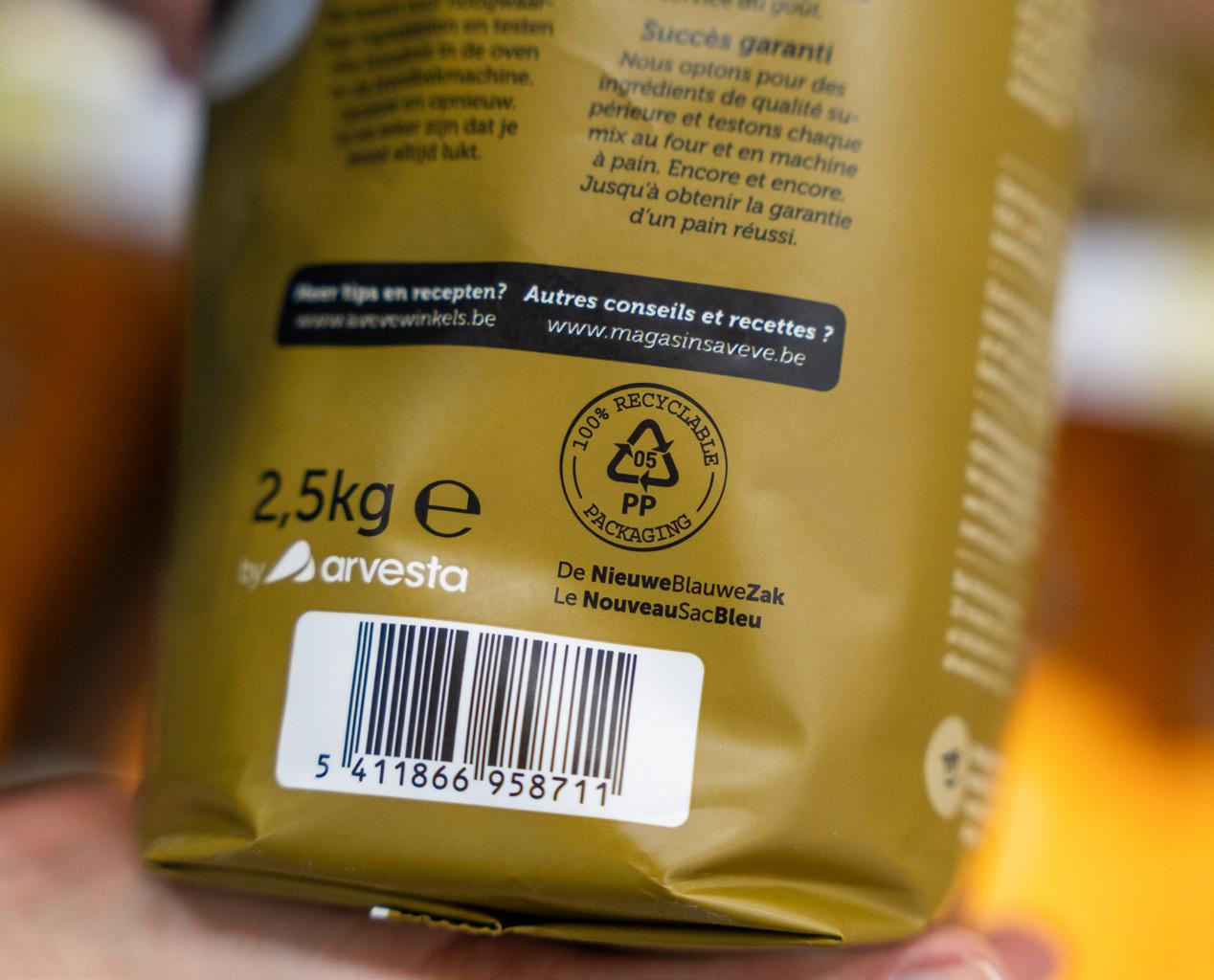
Our material impacts, risks, and opportunities (4)
Positive impact
• Valorisation of food industry waste streams (e.g. circular fertiliser Haspargit and sourcing by-products for animal feed)
Risks
• Customers increasingly demand transparency about the origin of (raw) materials.
• Current and emerging regulations for sustainable packaging.
• Pressure on margins due to higher cost of renewable raw materials.
The right partners for a circular future
Smart procurement policy
Packaging of seeds, animal feed, and flour mixes is part of Arvesta's daily operations.
To work out a smarter procurement policy around this, the Arvesta Procurement Strategy for Packaging project was started. With a broad team of employees, we selected suppliers who are future-proof. Together with them, we are preparing ourselves for the approaching strict European regulations on recyclability of packaging.
Continuous monitoring
Now that the new procurement policy is ready, we are working on implementing it in all business units. But suppliers should not sit back either. We ask them to identify strengths and challenges and start working on them together.
Valorising by-products
Where waste cannot (yet) be avoided, we deal with it as efficiently as possible. For instance, we use by-products from the food industry in our plant and animal nutrition. But Van der Hoeven's Circular City Greenhouses are also a good example of circularity and innovation. In addition, organic by-products from our production sites provide electricity generation via biogas plants. We compress cardboard and plastic film waste so that it can be efficiently collected and recycled.

Hilde Meelberghs Procurement Category Manager
A smarter procurement policy thanks to teamwork.

At Arvesta, we go for top quality not only in the products and advice we offer our customers, but also in our interactions with people. Whether employee, supplier, customer, chain partner, or stakeholder, we treat everyone with equal respect.
As Arvesta, whenever we see the opportunity to improve the lives of people inside and/or outside Arvesta, we seize it. We do this first and foremost by offering our employees healthy, honest work and paying attention to diversity, equity, and inclusion. The high score Arvesta receives in terms of employee satisfaction shows that we are doing a good job.
But we also extend these efforts to employees in the wider value chain, as well as our customers and local communities. We make informed choices about who we partner with based on sustainability reporting and consider customer satisfaction as a high priority. This has proven to be a successful approach all around.
Our Arvesta Experts are the backbone of our organisation, so an HR policy that invests in the personal growth of every employee is self-evident. But this does not happen automatically, says our CHRO, Karin Van Roy.
Letting over 2,300 employees thrive, how do you do it?
"Our HR department is one of Arvesta's most deeply rooted teams for a reason, with activities in all our departments. We work on the principle of 'people for growth, growth for people' and put maximum effort into the talent we have here. Social, physical, financial, and community well-being form the basis of our efforts."
Can you give some examples?
"Through the Fit@Arvesta programme, we motivate people to exercise and pay attention to healthy eating as well as sufficient sleep. But reliable, competitive terms of employment

with a flexible package of extra benefits are also part of our HR policy. Employees who want to can further roll up their sleeves and gain experience in our shops or production sites, or contribute to charities."
What specific steps were taken in 2024?
"We further rolled out the new digital employee platform 'SAP SuccessFactors'. This allows employees to easily communicate their needs around training or career paths and we avoid unnecessary administration. We are also focusing more than ever on fostering the 'desire to work' in our people by ensuring that everyone can be themselves and have a view of a career path that motivates them.
We take a tailor-made approach. Workers, white-collar workers, and managers alike must receive appropriate training, because only good leaders are supported by their people and can motivate them."

Karin Van Roy Chief Human Resources Officer
A positive working atmosphere is the best motivation.
Arvesta's HR achievements in awards!
"We were again honoured to receive some great awards in 2024, such as the 'Pioneering Employer Award'. I was presented with the 'Lifetime Achievement Award' at the #ZigZagHR ZoHRo awards, which I see as recognition for the entire organisation. The fact that our 'BeestigeBende' employer branding campaign stands out in times of labour market scarcity is the best proof that our approach works."

Our employees are worth their weight in gold, so they deserve a healthy, safe working environment. We create that through training, actions, and the right mindset. So, safety becomes everyone's responsibility.
Our material impacts, risks, and opportunities (2)
Positive impact
• Promote fair labour practices by respecting workers' freedom of association, collective bargaining rights and participating in proactive discussions with workers.
Negative impact
• Work-related accidents.

Five concrete actions
Reducing health risks for our employees is obviously a priority. By selecting five concrete, achievable action points for each of our production sites, we made sure that safety improved markedly by 2024. From asbestos removal and a revamped extinguishing system to updating safety toolboxes, we did it alleach time tailored to the concrete challenges of each site.
Mapping accidents
If things do occasionally go wrong, we want to know about it immediately. That is why every workplace accident is recorded for both internal and external employees. We think it is important to investigate where things have gone wrong and how we can take
preventive action. Zero workplace accidents is our target and by 2025, after a decline in 2023 and stagnation in 2024, we want to see another downward trend.
Everyone pulls the cart
To take the safety of our employees to an even higher level, everyone must do their bit. Not only are we committed to more training for prevention advisers, but we were also allowed to welcome a record number of employees to our first aid courses in 2024. By communicating openly with all staff and those in charge, we want to put safety at the top of everyone's agenda and encourage the active sharing of tips or concerns.

Learning through research and training.
Even though bad weather conditions are putting economic pressure on the agriculture and horticulture sector, the motivation of Arvesta experts remains enormous. Our surveys show another spike in employee satisfaction.
Our material impacts, risks, and opportunities (4)
Positive impacts
• Offering the opportunity for hybrid working & working from home.
• Providing training & development opportunities to employees.
• Increased employee satisfaction and retention through recognition, appropriate compensation, work-life balance, and an open corporate culture.
• Encourage innovation through human capital, good training and established culture and processes.

Employee satisfaction at a high level
Broader approach
Arvesta experts are the engine of our organisation. Year after year, our anonymous survey shows a top score in employee satisfaction.
To broaden our insights, we chose not to conduct a new internal survey in autumn 2024, but to engage artificial intelligence (AI).
This anonymous analysis of how employees express themselves on online platforms about working at Arvesta also showed similar satisfaction scores.
What could be better?
This stable, beautiful result deserves a pat on the back, but of course we are not blind to what could be improved. By putting the internal survey, the online analysis, and an employer branding study together, we can work on some areas for improvement in 2025. More insight into career opportunities
is one such action point that we will definitely work on.
Shared pride
These in-depth analyses also provide insight into the plus points employees bring up about working at Arvesta. Committing yourself to a meaningful cause, a nice working atmosphere among colleagues and the positive company reputation make employees proud to belong to our team.
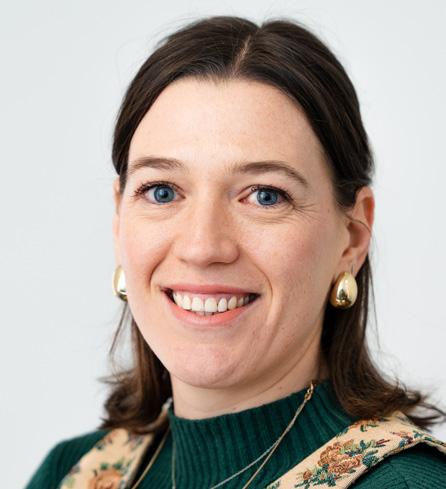
No strong work without strong employees. We value them and expect the same from the companies we work with. By scoring our preferred suppliers, we know that they too are committed to people and society.
Our material impacts, risks, and opportunities (5)
Positive impacts
• Advocate for fairer earning models for farmers.
• Educate farmers on agricultural trends/ developments and help them with specifications and implementation of new legislation or customer requirements.
Risks
• Costs related to evolving human rights due diligence regulations (e.g. Corporate Sustainability Due Diligence Directive)
• Human rights violations in the value chain.
Opportunity
• Improved customer loyalty by focusing on the (social) welfare of farmers and building a relationship of trust.

We really get to know our suppliers
Comprehensive survey
A sustainable procurement policy does not only mean that we watch over a good price/ quality ratio. The way our suppliers treat their employees and the importance they attach to human rights is also an important parameter.
Our Supplier Code of Conduct was thoroughly updated in recent years, and we developed a Sustainability Questionnaire. This extensive questionnaire gauges the efforts made by a supplier in terms of environment, people, and policy.
Nice result
In 2024, we were able to survey 80 of our 233 carefully selected partners (preferred suppliers) and from this we obtained an average sustainability score of 67%. A good result that matches our expectations. The score
may be even higher, as we do not yet have all the certification information of our partner companies.
We continue the work
The goal for 2025 is to further expand the number of suppliers surveyed so that we can even better consider which partners fit Arvesta. That effort is now happening for indirect procurement, but the business units also plan to start working with a similar sustainability questionnaire for the purchases they organise directly.
Our preferred suppliers score 67% on average in terms of sustainability.

Cedric Jacobs
Indirect Procurement Manager
About Arvesta
Promoting local food chains and regional sourcing, production, and processing through, for example, certifications and the 'Rural Delights' range in our shops.
Our material impacts, risks, and opportunities (1)
Positive impact

Sustainability at Arvesta
Sustainability at Arvesta
• Promoting local food chains and regional sourcing, production, and processing through, for example, certifications and the 'Rural Delights' range in our shops.
With more than 200 shops and several production sites and offices, Arvesta has a clear presence at home and abroad. We keep the impact on the surrounding area as small as possible. We not only meet the high requirements for an environmental permit, but also try to offer added value. Thanks to our sustainable image, many cities and municipalities are positive about our presence.
Our production sites are in SME or industrial zones and meet strict requirements around dust, noise, and traffic limitation. Our shops operate in locations that are good both commercially and in terms of mobility. Deliveries are made as efficiently as possible and the customer traffic of an Aveve shop is much lower than that of, for example, a
supermarket. To further reduce our impact on mobility, we invested heavily in bicycle parking facilities at our sites, with or without charging facilities for electric bicycles. This way, the number of people coming to work by bike increases noticeably.
good
We look beyond our immediate surroundings. For instance, we offer employees the chance to get involved in good causes. We are also an enthusiastic participant of the River Cleanup and are committed to a climate-neutral Leuven, the birthplace of Arvesta.

Our presence should be an added value, not a burden.
About Arvesta
The world is changing rapidly and managing data properly is more important than ever. So, protecting the data of customers, suppliers, and the operation of Arvesta remains high on the agenda.
Our material impacts, risks, and opportunities (2)

Sustainability at Arvesta
Sustainability at Arvesta
Risks
• Data breaches or cyber-attacks leading to reputational damage, operational disruption, and legal and regulatory consequences.
• Customers expect increased digitisation and automation in the food chain for greater transparency and traceability.
GDPR is evolving
The European General Data Protection Regulation (GDPR) legislation has been in force since 2018, but the topic remains constantly evolving. More data are being exchanged (digitally) and, at the same time, the threat of cyber-attacks is very topical. We have worked strongly on GDPR compliance over the past few years and we continue to work on this.
Publishing our data management policies transparently on our website(s) gives customers, suppliers, and other partners a clear picture of how we handle data. We keep these statements up-to-date by adapting them to new guidelines or tools used.
Our Arvesta employees are also involved in the importance of data protection. By sending out test emails, our IT department keeps employees alert for phishing attempts. In 2024, we organised eight GDPR workshops for five different target groups within the organisation. In these, we refresh the agreements around GDPR in an approachable way. How long can you store data? How do we store them? Especially for employees from HR, marketing, IT, and sales, this is very relevant. In this way, we create a climate in which conscious handling of valuable data becomes a reflex.
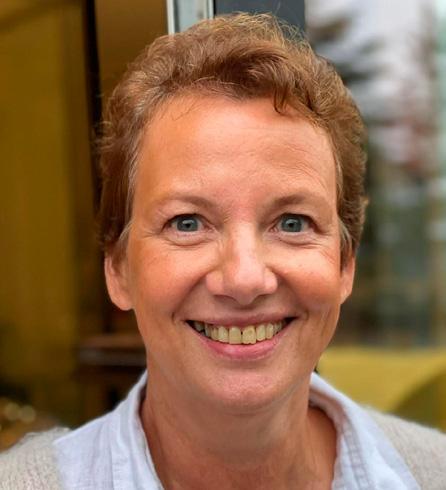
Data protection should always be top of mind.
Affordable food produced to the highest standards while offering a fair income to the producer. At Arvesta, we know it can be done.
Our material impacts, risks, and opportunities (3)
Positive impacts
• Advocate for and certify sustainable labels.
• Focus on reducing sugar and salt.
• Provide access to healthy, affordable food and reduce under- and over-nutrition.

Efficient food production
Thanks to our unique position at the centre of the agri-food chain, we have the responsibility and opportunity to put healthy and accessible food on the table. That story starts with supporting farmers and market gardeners to work even more efficiently throughout the growing season and every stage of their animals' lives. And doing so with solutions that are ecologically and economically viable. Concepts such as Varicare, fertigation, and circular greenhouse systems ensure that we help increase food security and efficiency. But our high-quality animal feed also contributes to this. Healthy animals perform better and that is an added value for livestock farmers and society.
Thanks to our shops and direct partnerships with the food processing sector, at Arvesta we are close to the end consumer. Customers are inspired to get started with top locally produced products and get healthy food on their plates. At the same time, we support local farmers by offering them a fair income through the contracts we enter together.
Healthy eating in the office
Of course, our own employees also deserve the very best; at our Wilsele headquarters and other hubs, we provide a range of locally produced lunches, snacks, and drinks that help employees make healthy choices.
Food should not only taste good, but also do good.
Offering farmers, gardeners, and consumers an experience with just that little bit of extra added value: that's what we stand for. We not only 'read' our customers, but also adapt our service and offerings to their needs.
Our material impacts, risks, and opportunities (6)
Positive impact
• Ensure high quality standards for all products manufactured and/or sold by Arvesta.
Opportunities
• Increase market share by maximising customer satisfaction and tailoring products and services to customer needs.
• R&D investment to develop new solutions that meet customer needs (growers, livestock farmers, etc.) while improving productivity and quality.
• Increase demand for products with better performance / different labels / certifications (e.g. nutriscore).
• Increase attractiveness to clients by focusing on sustainability & developing standardised ESG reporting.
• Reputation gain through election as Retailer of the Year Belgium and Best Chain Store.

We go the extra mile for our customers
Listening to the customer
With a Net Promoter Score of 73%, our Aveve shops are at the top of the retail landscape in terms of customer satisfaction. We also won the award for best Garden and Animal retailer for the 17th time in a row and the award for best garden webshop for the second time in a row. But that does not mean we are going to sit back - quite the contrary. We conducted a broad survey to gain even more insight into our customers’ needs and buying behaviour. Based on this data, we will look at how our shop concept and range can evolve to meet customer expectations even better.
Within the Animal Nutrition Business Unit, not only our position as market leader in animal feed is an important parameter. We also conducted a customer satisfaction survey among professional livestock farmers in 2024,

measuring not only satisfaction but also loyalty, added value, and competitiveness. Our score of 71%, shows that customers value our feeds and service, with loyalty and added value in particular emerging as our major strengths.
The same survey was conducted among customers of the Agri & Horti Business Unit and gave us a result of 72%. That is an increase of seven percentage points compared to 2022, which again confirms our strong relationship with farmers and horticulturists. This survey is not there to give ourselves a pat on the back, but rather offers insights into what is good and what could be even better. So, we aim for at least as high a score by early 2026.

While nobody is perfect, including at Arvesta, we pride ourselves on sincere and transparent policies that make forward-looking choices and avoid unfair practices.
We don't just want to follow the rules, we want to be one step ahead when it comes to balanced policies, strong management, and proper business ethics. We make clear agreements not only for our own employees but also for companies we work with.
Ethical business is not just about people. Animals also deserve a dignified and healthy life. By supporting farmers and hobby farmers with our products, innovations, and knowledge, we increase animal welfare in a way that also pays off in the long term.
Contents About Arvesta
Integrity is not one of Arvesta's core values for nothing. We do business with respect for employees, customers, and supply chain partners. By listening to every story, we continuously refine our policy at organisational level.
Our material impacts, risks, and opportunities (3)

Keep learning from every story

Sustainability at Arvesta
Sustainability at Arvesta Environment
Positive impacts
• Advocate for fair, sustainable agriculture, and animal welfare.
• Implement a sustainable procurement policy for all Arvesta companies.
• Strong cooperation with academia and research centres on innovation.
Preventive polishing
Anyone working at Arvesta should be able to count on a positive corporate culture, based on a clear regulatory framework. By monitoring what goes well and paying attention to areas for improvement, we take steps forward. Arvesta's compliance committee meets on a regular basis and looks at what actions can be taken to make the company consistently meet and exceed our high ethical standards. We do not stare blindly at small questions but seize them to work in an overarching and preventive way.
Jump right in
Of course, our customers also deserve an honest, transparent collaboration with Arvesta. That is why we immerse our employees in the do’s and don'ts of our organisation,
as well as the legal provisions that apply right from the start. HR's onboarding days are the ideal opportunity for this. In 2024, we also made sure that our risk management policy is easily visible on the Arvesta intranet.
Ethical partnerships
What applies to our employees and customers also applies to our relationship with supply chain partners. Updating our Code of Conduct and Supplier Code of Conduct and giving each preferred supplier a sustainability score from 2024 will provide us with better insight into the efforts of suppliers. Because those who do business ethically have an edge!
We closely monitor areas for improvement and address these at farm level.
Animal welfare and how we deal with it as a society is constantly evolving. At Arvesta, we start from a focus on animal health and keep looking for improvement. Taking the lead is important, but without losing sight of the market.
Our material impacts, risks, and opportunities (4)
Positive impacts
• Improving animal welfare by producing healthy and balanced animal feed.
• Exclusion of antibiotics in animal feed to prevent antibiotic resistance and treatment of healthy animals.
• Improving animal welfare through value chain cooperation (incl. development of animal welfare labels) and by selling pet products that contribute to the health and happiness of companion animals. Opportunity
• Products that improve animal welfare.

For both hobby and farm animals, a healthy animal is the basis for animal welfare. The Arvesta range not only consists of highquality basic feeds, but we also have a wide range of solutions to provide that extra health boost. We remain strongly committed to research and development to improve our range.
Customised feeds
Each stage of life requires an adapted feed. In 2024, for instance, we prepared to develop a sow feed that maintains fitness during lactation. We are also investigating whether adapted feed can contribute to the welfare of pigs with intact tails. Thanks to Taintstop, we offer a solution to possible boar taint in uncastrated pigs. Within the dairy farming sector, transition feeds that facilitate dry-off are an important strength. And we also offer
adapted solutions for poultry within the Better Chicken Commitment concept and other slow growers.
With our innovative feeds, we are ready to meet the changing animal welfare requirements of the market. However, the willingness of all links in the chain to fairly remunerate additional efforts is not yet sufficiently developed for all concepts. In the coming years, the search for improvement remains our focus, but always with the economic feasibility for the livestock farmer in mind.

We are ready for the changing welfare requirements of the market.

Please refer to www.arvesta.eu for the following attachments:
• Notes on the financial figures
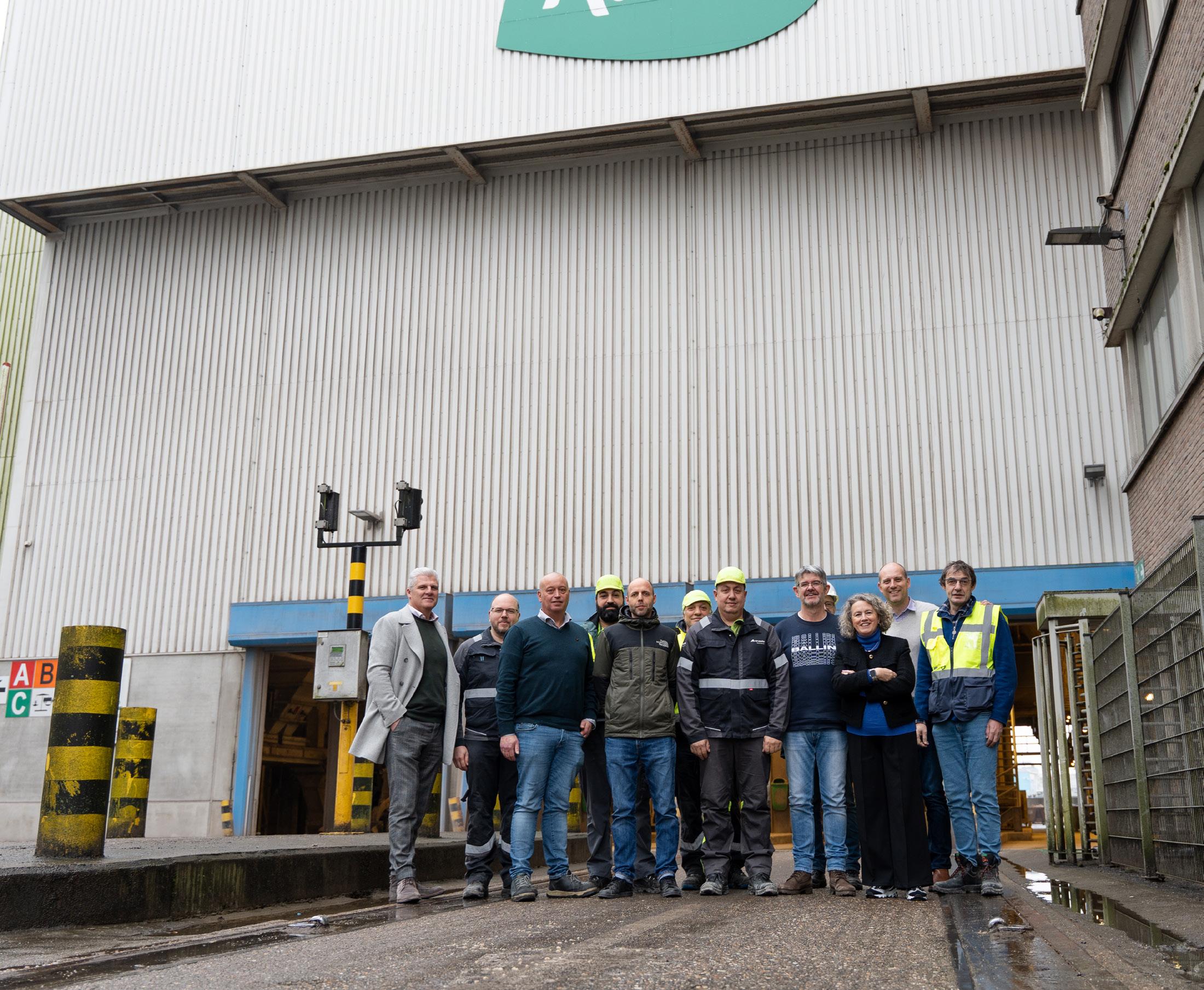
• Consolidated profit and loss account
• Consolidated balance sheet
• Consolidated cash flow statement
• Corporate governance
• Sustainable Development Goals
• Double materiality assessment methodology
• Overview of ESG topics linked to ESRS standards
• CSRD Scope

